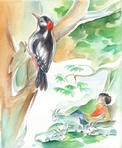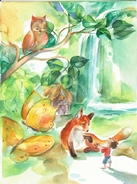Basic Pedagogical Concepts Music lessons can foster skills and abilities. Improvisation can encourage individual artistic expression as well as creativity and the courage to take the initiative. One can also learn how to empathise and to work as a team, as well as general social skills such as balancing consideration and assertiveness during group activities like rhythmical playing in a circle or free playing. Apart from measurable and comparable progress in the material being learned, this encouragement of the pupil's personality takes on another role. In today's modern world, personal stability, self-confidence and creativity when solving problems are important skills both in one's private life and for successful work in society. In recent years, education - including music education - has based its innovations on, among other things, the findings of other sciences such as neurology, anthropology and social sciences. An approach that takes the differently developed artistic and social abilities and needs of different pupils just as seriously as cognitive learning steps will develop the young person in the best possible way.
The following three elements enliven lessons and make them artistic:
on a social level = creation of a fear-free space of confidence, openness for the pupils' new ideas
on a pedagogical level = balancing out of one-sided tendencies in lessons; breathing, healthy lessons
on an artistic level = a search for coherence when playing in groups through concentrated listening and mutual reflection, practising towards increased concentration.
About Free Play Learning to play freely, also known as improvising, requires a certain amount of effort at first. We are used to playing a specified piece confidently. As long as we make no mistakes, no-one will criticise a widely recognised piece. Improvisation is a different case altogether. It is a spontaneous and very personal effort. And it doesn't always succeed. We expose ourselves much more openly to criticism. In the beginning it's rather like walking on ice. Yet the advantage is that, by getting used to playing freely. I can acquire a different and more acute feeling for my instrument and its possibilities, and my feelings are more intensely involved with the music I'm making. I try things out, allow new ideas in, take my time, become playful and remain internally open, including to the possibility of joining with other players. Thus the instrument becomes a close friend in the service of one's own ideas. Thereby grows the desire to master it in all its intricacies. The ability to listen changes too. The judgement is less about right and wrong, but rather about other qualities such as sluggish, confused, interesting, exciting, rounded, fitting the mood, without content, sad, funny, surprising, lacking a good conclusion.
Improvised play is possible, even with a small instrument like a recorder.

